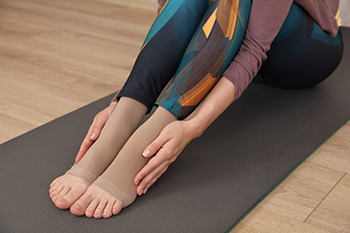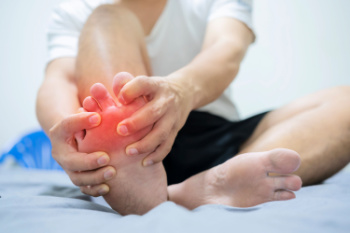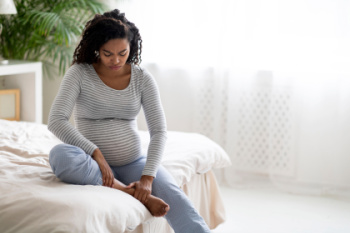

Poor circulation in the feet occurs when blood flow is restricted, often leading to discomfort, numbness, or a cold feeling. Causes include peripheral artery disease, diabetes, smoking, and a sedentary lifestyle. Risk factors include high blood pressure, high cholesterol, and obesity. Symptoms of poor circulation include tingling in the feet and toes, swelling, discoloration, or slow-healing wounds. These signs should not be ignored, as they may indicate more serious health conditions. A podiatrist can evaluate circulation, perform diagnostic tests, and recommend treatments such as compression therapy and lifestyle changes. If you experience persistent foot discomfort or signs of poor circulation, it is suggested that you consult a podiatrist for a thorough evaluation and personalized care plan to improve your foot health and overall well-being.
Poor circulation is a serious condition and needs immediate medical attention. If you have any concerns with poor circulation in your feet contact Dr. Robert Hope of Riverside Podiatry. Our doctor will treat your foot and ankle needs.
Poor Circulation in the Feet
Poor blood circulation in the feet and legs is can be caused by peripheral artery disease (PAD), which is the result of a buildup of plaque in the arteries.
Plaque buildup or atherosclerosis results from excess calcium and cholesterol in the bloodstream. This can restrict the amount of blood which can flow through the arteries. Poor blood circulation in the feet and legs are sometimes caused by inflammation in the blood vessels, known as vasculitis.
Causes
Lack of oxygen and oxygen from poor blood circulation restricts muscle growth and development. It can also cause:
Those who have diabetes or smoke are at greatest risk for poor circulation, as are those who are over 50. If you have poor circulation in the feet and legs it may be caused by PAD and is important to make changes to your lifestyle in order to reduce risk of getting a heart attack or stroke. Exercise and maintaining a healthy lifestyle will dramatically improve conditions.
As always, see a podiatrist as he or she will assist in finding a regimen that suits you. A podiatrist can also prescribe you any needed medication.
If you have any questions please feel free to contact our office located in Tuscaloosa, AL . We offer the newest diagnostic and treatment technologies for all your foot and ankle needs.

Toe pain can stem from a variety of everyday causes. Stubbing the toe may lead to bruising or even fractures, while wearing tight or narrow shoes can cause pressure, irritation, and alignment problems. As people age, joints in the toes may stiffen or develop arthritis, leading to chronic discomfort. Persistent toe pain should not be ignored, especially if it interferes with walking or daily activities. A podiatrist can diagnose the source of the pain, offer treatments to relieve discomfort, and suggest footwear or custom supports to prevent future issues. If you are experiencing toe pain, it is suggested that you schedule a visit with a podiatrist to restore comfort and maintain your foot health.
Toe pain can disrupt your daily activities. If you have any concerns, contact Dr. Robert Hope of Riverside Podiatry. Our doctor can provide the care you need to keep you pain-free and on your feet.
What Causes Toe Pain?
Most severe toe pain is caused due to a sports injury, trauma from dropping something heavy on the toe, or bumping into something rigid. Other problems can develop over time for various reasons.
Toe pain can be caused by one or more ailments. The most common include:
When to See a Podiatrist
Diagnosis
In many cases the cause of toe pain is obvious, but in others, a podiatrist may want to use more advanced methods to determine the problem. These can range from simple visual inspections and sensation tests to X-rays and MRI scans. Prior medical history, family medical history, and any recent physical traumatic events will all be taken into consideration for a proper diagnosis.
Treatment
Treatments for toe pain and injuries vary and may include shoe inserts, padding, taping, medicines, injections, and in some cases, surgery. If you believe that you have broken a toe, please see a podiatrist as soon as possible.
If you have any questions please feel free to contact our office located in Tuscaloosa, AL . We offer the newest diagnostic tools and technology to treat your foot and ankle needs.

During pregnancy, many women experience foot problems due to changes in weight, hormones, and circulation. One common issue is swelling in the feet and ankles, caused by fluid buildup and pressure from the growing uterus. Hormonal changes can loosen ligaments in the feet, sometimes causing the arches to fall and leading to flat feet or overpronation, which means the foot rolls inward when walking. This can cause pain in the arches or heels. Weight gain during pregnancy also increases pressure on the feet, often resulting in plantar fasciitis, a condition where the band of tissue along the bottom of the foot becomes irritated. Additionally, some women notice toenail changes, such as ridges or discoloration, and even an increased shoe size due to foot structure changes. A podiatrist can help relieve discomfort, address structural changes, and prevent more serious complications by recommending professional care options. If you are experiencing foot pain during pregnancy, it is suggested that you schedule an appointment with a podiatrist for appropriate care.
Pregnant women with swollen feet can be treated with a variety of different methods that are readily available. For more information about other cures for swollen feet during pregnancy, consult with Dr. Robert Hope from Riverside Podiatry. Our doctor will attend to all of your foot and ankle needs.
What Foot Problems Can Arise During Pregnancy?
One problem that can occur is overpronation, which occurs when the arch of the foot flattens and tends to roll inward. This can cause pain and discomfort in your heels while you’re walking or even just standing up, trying to support your baby.
Another problem is edema, or swelling in the extremities. This often affects the feet during pregnancy but tends to occur in the later stages.
How Can I Keep My Feet Healthy During Pregnancy?
If you have any questions please feel free to contact our office located in Tuscaloosa, AL . We offer the newest diagnostic and treatment technologies for all your foot and ankle needs.